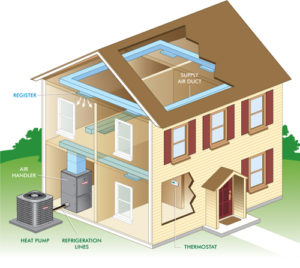 This March, we had a whole month of lions, as our local temperature ranged from a high of 70 to a low of 27. Traditionally, climate-control solutions for unpredictable temperatures have been a furnace to produce heat when it’s cold and an air conditioner to remove heat when it’s hot. This approach, of course, works very well, but as energy prices rise and weather gets more and more unpredictable, homeowners are considering heat pumps for a more efficient, sustainable, and affordable way to stay comfortable.
This March, we had a whole month of lions, as our local temperature ranged from a high of 70 to a low of 27. Traditionally, climate-control solutions for unpredictable temperatures have been a furnace to produce heat when it’s cold and an air conditioner to remove heat when it’s hot. This approach, of course, works very well, but as energy prices rise and weather gets more and more unpredictable, homeowners are considering heat pumps for a more efficient, sustainable, and affordable way to stay comfortable.
When you know how an air conditioner works, you’re already familiar with how a heat pump works. During hot weather, a heat pump will pull heat energy out of your home by passing warm air through a refrigerant. The refrigerant traps the heat energy, which is then pumped outside your home while the newly cooled air is circulated inside.
During cold weather, heat pumps reverse this process, pulling heat energy from outside the home and exchanging it with cooler air inside. Unlike a furnace, which uses energy as fuel to create heat, a heat pump uses energy to move already existing heat from one place to another.
We know what you’re thinking: what heat can a pump possibly find when the temperature outside is below freezing?
It might be hard to believe that a heat pump can keep you cozy by using heat from the winter air, but even in very cold temperatures, the air outside retains heat energy – and a heat pump puts that tiny amount of energy to very efficient use.
By controlling the pressure of refrigerants, heat pumps can capture and consolidate heat—even the smallest amounts that exist on a frigid day—and move that heat inside your home. While many heat pumps use this air-to-air exchange method, some heat pumps can use heat energy trapped in the ground to provide a more stable source of heat energy. Many heat pumps are also equipped with electric resistance heaters as backup during extremely cold weather. Heat pumps can also be installed as part of a hybrid heat pump and furnace system. Best of all, heat pumps work with your existing air-conditioning duct work. They are also available as ductless units.
Because heat pumps only have to move heat energy from one place to another, they use about 50% less electricity to operate and produce 3 to 6 times as much heat per unit of energy used than a gas-fired furnace. Newer, high-efficiency heat pumps also dehumidify better than standard central air-conditioners, creating a more comfortable home while using substantially less energy. Even better – if you are considering solar panels to provide electricity for your home and heat pump, you can enjoy an efficient, effective and clean energy solution, whatever our fickle Midwestern weather throws our way.
Would you like to talk to Maertin Heating & Cooling about the benefits of heat pumps? Just reply to this email or call 708-479-9350. We’ll be happy to help!



Add Comment